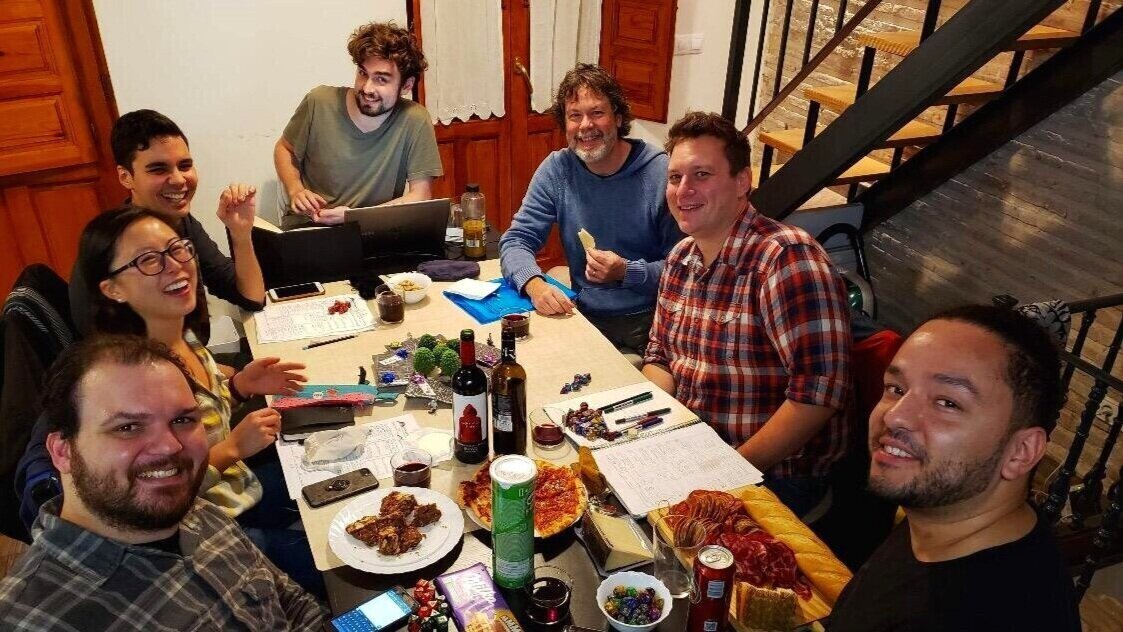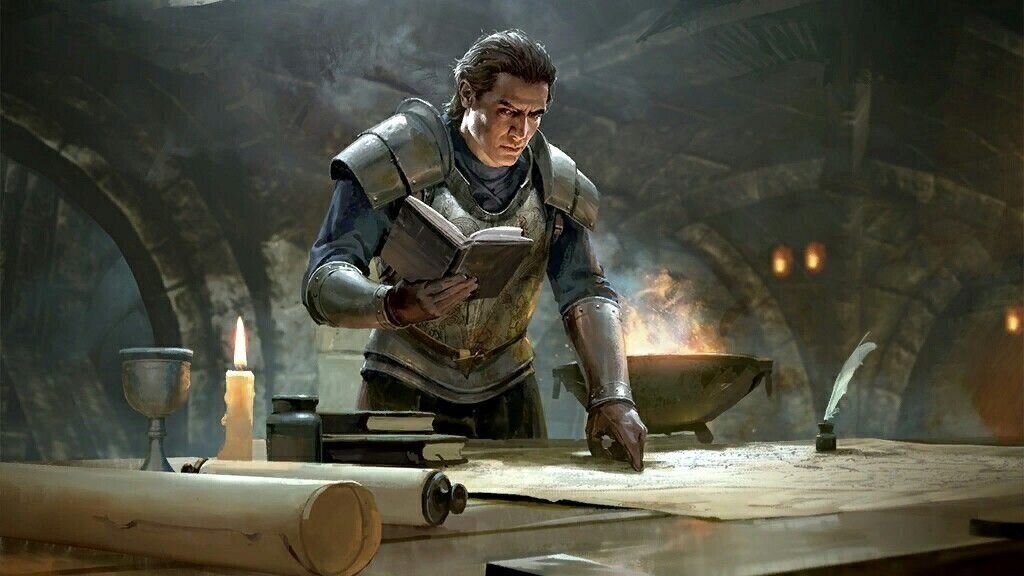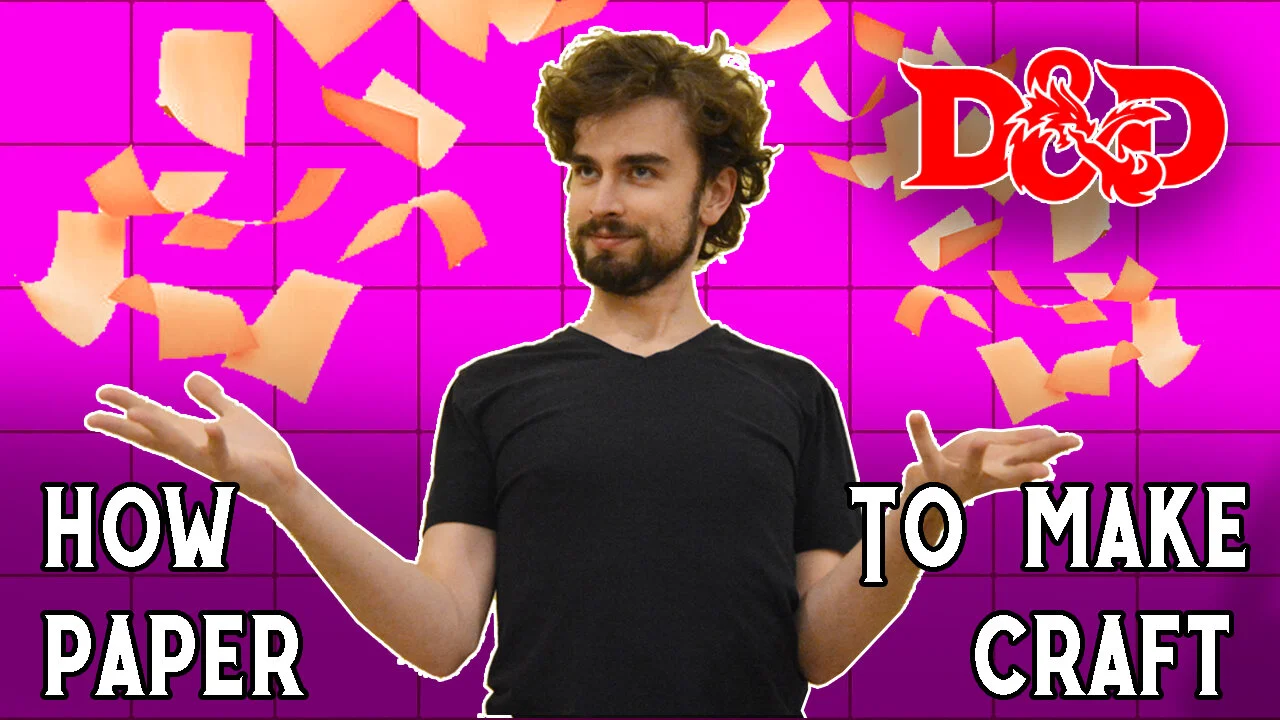How To Prepare For Your FIRST D&D Session
This is way too Epic Thumbnail for this subject…
It's quite daunting to start your first D&D session. There are many tools that you might not know yet. You will need to decide on your Note structure, for having a productive D&D session, how to balance the game itself, since there are so many things to juggle at the same time. Today we will be looking at how to prepare for your D&D session and learn a couple of ways how to avoid some of the mistakes I made as a Fresh Dungeon Master.
For the love of God, Don't Over-Prep.
First things first, there is nothing worse than preparing too many notes for your first D&D session. You could think that you will miss something by not including it in your notes, but when you try to include EVERYTHING, what you're doing is drowning yourself slowly in that information. What happens if you over-prep, during your DnD session, you will be lost and out of focus, trying to find those juicy lore bits, essential character descriptions, and the most crucial things. Oh, you think you're a tough guy/gal, and you have a laser beam focus? Wrong, when you will need to roleplay your characters, order the initiative, and do all of the combat things, you will be lost in your sessions if you have poorly structured notes and don't use necessary tools. Trust me on this one.
The Flow of the Game
Before we get into the structure and tools, we need to understand how Dungeons & Dragons are structured so that we could make structure around that structure. I know it's confusing, but D&D session lasts for around 3-6hours in most cases. That's a lot of time that we need to make content for it, right? So what do we do? Plan each hour? Wrong. When it comes to planning for your session, I found that for myself that one session can hold around 5-6 encounters. Encounters are something that your player characters encounter during the session like a band of thieves, a quest giver offering a quest hook, dungeon crawling, and similar things. For Example, let's take an example of this simple quest and how to prep for a session:
Summary: Town Elder wants you to bring back his pan. Goblins stole it.
Quest Name- "Pan-ic in the Air"(That's how I named it, shut up):
Guest giver - Town Elder, Secretly, he likes to steal small trinkets of sentimental value.
Name - Elderon Towin. (Halfling, Ginger with a charming smile)
Likes - His pan. Dislikes - Goblins.
Combat Encounter - 5 Goblins, Hills, Have traps Plot twist - Halfling framed the Goblins, since he was stealing too many local trinkets and needed a scapegoat. Even stole one SHINY(This will be useful in the future) gem from goblins.
Okay, let's restructure this into encounters for our session.
I - Player Characters are introduced to a quest, by a notice board, by the town elder or a villager that trinket was stolen.
II - Seek out the Quest giver and talk about the problem.
III - Travel, search for the goblins if Elder is not suspected.
IV - Find Goblins tracks have a small encounter.
V - Have a bigger encounter in the Goblin Camp.
VI - Reveal the most dramatic Plot Twist - The stolen Pan is a lich phylactery, introduce the end of times and end your campaign in GLORY...
Okay, not that, but that's how I plan out those 5-6 encounters. Now I will go in-depth, writing more about each encounter, descriptions, and so on. But remember - Not too much. When you want to plan to create the whole world, epic saga, and other things, try to guide yourself by making 5-6 encounters for one session. Pour your creative energy there, rather just overpreparing by writing lengthy descriptions of the local cheese flavors(Cause no one fricking cares).
This amount of encounters will be enough for one session, and there is no good reason to make even more. But sometimes I indulge myself and prepare a couple of encounters in the future sessions. Having a bit extra ensures that I don't run out of content if players would complete the encounters way more quickly than I expected.
Modules or Homebrew?
Before we go into more structure and tools, you need to think about how much time you have spare in your life. I prepare for about 3-5hours a week for one session that lasts around the same amount of hours. I like it. It's relaxing for me. But if you don't have that time, another option is to run Official D&D adventure books, but in my opinion, homebrew is the most fun you can have, leave the books for gathering inspiration from them. But if you do decide to run Official D&D adventure books, at least read once the whole book to see where the plot will take your players and prepare in a similar fashion where you prepare a small chunk for one session.
Tools for your First Session
Decide on which note application you will use.
I layout most of the reasons in the video above why I choose specific applications for my notes, the apps I use for preparing for my game is either Evernote or OneNote. Evernote is excellent since it lets me sync with many devices at ease, and I can make templates that ease my preparation. At the same time, OneNote is an excellent choice if you're looking for a way to link your notes with each other and efficiently and make such things like the Flowcharts(Which will be very useful in the future for you).
Music apps
I use Spotify. I curated some of the playlists here, and if you're looking to get some proper music for your table, follow my playlist, and you'll save an enormous chunk of time by making them yourself. If you don't have Spotify Premium, another option is finding RPG soundtracks on Youtube, but even then, I prefer Spotify if you have the opportunity.
Extra stuff - Tech
Laptop - I use my laptop during the session. It acts as a DM screen, and also, if I have a good note structure, I can find my information with ease while I'm DM'ing a game, finding conditions if the mind blanks on me, it's perfect.
Tablet/iPad - For Maps and Handouts.
Now, this advice is a bit advanced, but if you want to handout things, you can give out a map or other things while using an iPad. It's ecofriendly, and also, it's great if you want to edit somethings and just put the updated version back to the note application like Evernote and present it once again to your players.
Keep It Organized
In order not to drown in your Dungeon Master Notes, try to establish the as little amount of categories to your notes as you can, cause that will scatter your focus during the session. Another thing is to merge the notes as much as you can. If you have the world/region/cities categories of your notes that will become confusing while trying to search for them while trying to merge that needed information into one will prove to be useful. There are so many things to manage at the same time during a session, so don't waste your time searching for the notes you need. Try To see the whole note - Even when I write different notes about my cities, encounters, etc. I tend to make the Master Note for the session I'm running with a strict formulaic structure, that I could follow each session. I tend to put all of the necessary and useful information in one note in order not to scatter my attention. My master note consists of:
Beginning
Acts/Encounters (Around I-V different ones)
Ending
More Knowledge on the Topic: Death Saving Tips To Organize Your Game
Before and Aftercare of your Players
Before you start, have some prologue to your first session, maybe some story about the campaign/Oneshot, you are going to run to get your players a bit in the mood for the campaign. You know what I'm saying, talk dirty for the first time with them...I mean... Like with some sweet and dirty prologue... Yeah...you like that?.. and after you're done, baby... Ask them for feedback.. some juicy feedback.
If I didn't disgust you already with the last paragraph, the whole idea is to have some introduction to your session, where that moment represents leaving your usual day worries and get into the fantasy world that you created. Don't overdo it, because it will become cringy, but after the first session is completed, replace this with your player's recaps of the last session what happened. Recapping includes other players in the process of telling a story. It promotes roleplaying a bit, and also it's a great moment to listen to what your players appreciate about your game, what they think about the characters, and the plot. It's probably the best moment to find clues on how to improve yourself as a Dungeon Master.
After your first D&D session, crack a beer, champagne, or whatever suits you and ask your players for feedback about the session Every.Single.Time.After.A.Session. This will let you improve your DMing skills, and also it will be a great moment to give feedback to your players. For now, just try to ask open-ended questions and try not to go with direct Yes or No questions like - Did you liked the session? Instead, ask questions like - What do you think about the session? What was good/bad about the session, and the answers your players provide will help you become a great Dungeon Master in the future.
Expect the Unexpected
Okay, I think this will be enough for the first session you prepare. It's simple, and let's keep it that way for quite some time. But even when you plan, know that your plans will likely fail. Dungeons and Dragons plans are destined to be changed at the spur of the moment by the wild and unpredictable nature of D&D player's decisions. So never hold to your plans with an iron fist, rather than "Sticking to your incredible plan." If you resist this rule, you will have a railroading dnd session on your players and that my dear fellow will make you hated and despised DM. So try to avoid it at all coast. The story doesn't belong only to you. It belongs to every single person at the table, even if you write it. But in actuality, if you want to improve the unexpected element of your game, it's best to try to know your players.
Read Next:
Essential Things to Get When Starting to Play D&D
The Ultimate Dungeons And Dragons Holiday Gift Guide(2020)
#DungeonGoblin #Episode5 #SessionPrep #DungeonsAndDragons
If you enjoyed this content and want to see more of Dungeon Goblin content, consider supporting us on Patreon. Dungeon Goblin is a new blog, and your support matters immensely to us. We want you to become one of the first Dungeon Goblin supporters and grow it into something amazing one day. Thank you for reading and watching!











